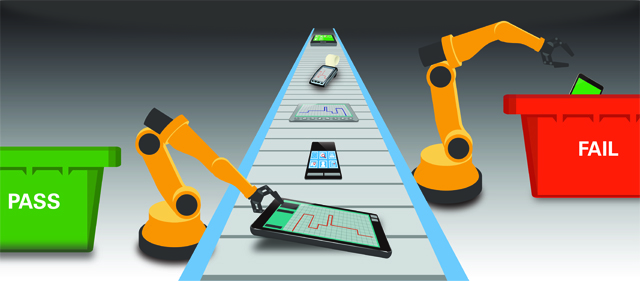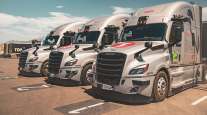Searching for an ELD? It’s Buyer Beware

This story appears in the April 17 print edition of iTECH, a supplement to Transport Topics.
Whether a fleet already has selected a system to comply with the electronic logging device mandate or still is waiting to do so until later this year, there is no guarantee that those products will be legal for use later on.
Much of the reason is that, rather than the Federal Motor Carrier Safety Administration testing each ELD model to validate that it meets the required standards, the agency is relying on the vendors to self-certify their devices.
BEST OF APRIL iTECH: More stories, columns
And that’s leading to some uneasiness in a marketplace that has seen a dramatic increase in the number of ELD vendors, including some companies that never have been involved in providing the predecessors to ELDs — known as automatic onboard recording devices, or AOBRDs — or any other facet of hours-of-service compliance.
To comply with the mandate, carriers have until Dec. 18 to switch from paper logbooks to ELDs to record drivers’ hours of service.
All it takes for an ELD to be self-certified is for the vendor to register it on FMCSA’s website, including certain documents about each model along with at least one image.
At press time, more than 30 devices were registered, although the majority were from lesser known players. Most of the larger, well-known names in truck technology said they will self-certify later this year after they complete more testing and possibly receive more guidance from FMCSA.
So how can a fleet be assured the devices it is using now or plans to install later will be legal?
“Carriers need to choose an ELD provider that can be relied on over the long term,” said Alexis Capelle, ELD program manager for Continental Corp., provider of VDO RoadLog. “They should perform the required due diligence to find a supplier that has experience with electronic logs and that will be able to stand behind its products as the regulations evolve.”
In other words, let the buyer beware, a sentiment expressed by a number of ELD providers.
“As a buyer, you have to believe, either through your own due diligence or through market knowledge or however you’ve gained the ability to understand the vendor’s capabilities, that their system complies with the regulations,” said Eric Witty, vice president of products for PeopleNet, another fleet technology provider that has been in the marketplace for many years.
Complicating matters is the fact that FMCSA has published test procedures for ELD makers to follow, but there is no requirement they must be used. The vendor does have to indicate if it followed the agency’s test procedures or its own. However, this also leads to a bigger problem.
“The test procedures from the FMCSA are not sufficient to serve as guidelines for designing an ELD product that is fully compliant,” Capelle said. “Many other tests need to be conducted. So whether a vendor uses the FMCSA test procedures or not does not determine whether an ELD is truly compliant or not.”
All this leads to the possibility that an ELD model could later become decertified by FMCSA, leaving a carrier just eight days to come up with a replacement system, according to agency guidance.
If people suspect a device is faulty or not compliant, they could submit a challenge to FMCSA through a formal process, said Tom Cuthbertson, vice president of regulatory compliance at Omnitracs. “FMCSA has to review that challenge and determine if the product is compliant or not, and if it’s not compliant, it can be brought down off the agency’s website.”
So where could such challenges come from? Most likely from law enforcement, said Norm Ellis, North American president for ERoad, a new entrant into the U.S. ELD market. The New Zealand-based company, however, has provided road use and fuel-tax management systems since 2000.
As law enforcement officers audit driver logs in the field, that level of scrutiny ultimately will determine whether the self-certification of that particular device was valid.
“It will come out through the enforcement community as a result of their audits and/or on-road inspections,” said Ellis, a former longtime executive at Qualcomm Enterprise Services, which now is Omnitracs.
Ellis and others said that this will pressure ELD providers to ensure customers are getting a product that meets government standards. Otherwise, they likely will not be around long. But that, too, means the carrier has lost money and time.
Aside from carriers doing their homework on the ELD vendors, another way to make sure that an ELD model will meet FMCSA’s standards is by conducting independent third-party verification and testing.
While there are few providers of such a service, FP Innovations’ engineering and research firm, PIT Group, announced in October it is offering to test ELDs.
Yves Provencher, PIT Group’s director of market and business development for transportation, said the firm was inspired to get into ELD testing after hearing concerns about the mandate from fleets and ELD suppliers.
“Last fall, a couple of suppliers came to us … almost begging … saying can you do something for us, because we see that people are putting their names on the [FMCSA ELD certification] website, and we don’t believe that these are necessarily all serious companies,” he said.
Provencher said the decision to begin testing ELDs was natural for the Canadian organization because it has been providing what it says is unbiased testing of truck products, including fuel-efficiency technology, since 2008.
PIT Group said it will follow the latest version of the ELD test plan and procedures issued by FMCSA.
PIT Group already has signed off on the ELD being offered by ERoad, though Provencher said several more vendors have contacted the company recently about going through its ELD-verification program. The firm plans to provide the testing only when requested and paid for by the vendor to help cover the costs for the not-for-profit organization.
A similar validation service is available from TransSafe Consulting, which recently signed off on ELDs offered by iGlobal. TransSafe is run by former FMCSA chief Annette Sandberg.
While it’s too early to tell how many providers will be using an independent ELD-verification service, some large vendors said they are not that interested in such testing.
Omnitracs’ Cuthbertson said the company has been doing its own testing. Many employees there have been involved in the development of electronic logging since 2005, including working with FMCSA and the Commercial Vehicle Safety Alliance.
Others say they are not against it.
“We feel like we’ve been doing this stuff a long time, but I think more of an independent audit is something we certainly are not against,” PeopleNet’s Witty said. “If there’s some value in the marketplace for us to stamp somebody’s name of approval on there or some third party that brings credibility to our certification, we would absolutely do that.”
Such verification isn’t necessarily a requirement in the eyes of Brian Fielkow, CEO of Houston-based Jetco Delivery, a 125-truck fleet that serves local, regional and over-the-road markets.
“It comes to the integrity of the vendor,” he said.
As trucking firms look for the right ELDs for their fleets, they should keep in mind that each has “different perks and specialties,” said Michael Cattaneo, fleet manager for Oregon-based Lile International Cos., a household goods mover and logistics company with more than 130 trucks.
“People need to ask themselves what they really want out of the system,” he said. “Most of the companies are very different in their approach.” ³




